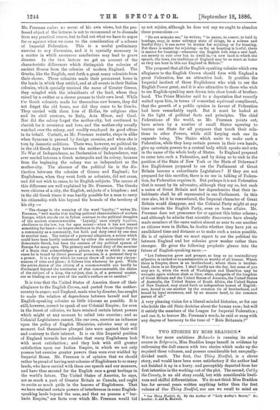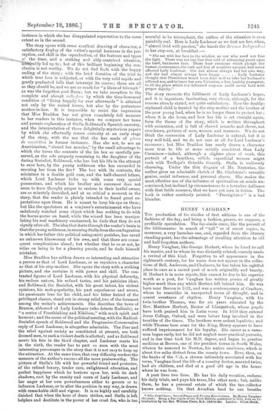TWO STORIES BY MISS BRADDON.*
WHILE her more ambitious 31ohau:ke is running its serial course in Belgravia, Miss Braddon keeps herself in evidence by enlivening the dull season with two stories which make up the required three volumes, and possess considerable but unequally- divided merit. The first, One Thing Needful, is a clever story, and would have been more satisfactory if the author had not finished it up in a hurry, and perceptibly departed from her first intention in the working-out of the plot. The second, Cut by, the County, is an old story retold, but with considerable liveli- ness and skilful differentiation. We do not think Miss Braddon, has for several years written anything better than the first volume of One Thing Needful, nor can we recall to mind an • One Thing Needful. &e. By the Author of "Lady Andlera Secret," Ire. London: J. and IL Maxwell,
instance in which she has disappointed expectation to the same extent as in the second.
The story opens with some excellent drawing of character, a satisfactory display of the writer's special keenness in the per- ception, and skill in the reproduction, of the features and types o! the time, and a striking and ably-contrived situation,
bly led up to ; but of this brilliant beginning the con- clusion is not worthy. We do not find fault with the happy ending of the story ; with the brief duration of the trial to which true love is subjected, or with the very mild rapids and gently graduated falls that interrupt its course; these are all as they should be, and we are as much for "a blaze of triumph" as was the forgotten poet Bunn; but we take exception to the complete and abrupt voile face by which the time-honoured condition of "living happily for ever afterwards" is attained not only by the united lovers, but also by the portentous mother-in-law. It is impossible to resist the impression that Miss Braddon has not given completely full measure to her readers in this instance, when we compare her tame and prosaic explanation of Stella Boldwood's Spanish ancestry, and the interpretation of those delightfully-mysterious papers by which she effectually rouses curiosity at an early stage of the story, with the use that she has made of pices de conviction in former instances. Has she not, to use an Americanism, "sinned her mercies," by the small advantage to which she turns the contents of the tin box so carefully pre- served, as the sole property remaining to the daughter of the daring Socialist, Boldwood, who has lost his life in the attempt to save hers, by the young nobleman who has succeeded in rescuing her from the fire!' The box with its contents, the miniature in a double gold case, and the half-charred letters, which Lord Lashmar locks up with some very special possessions, and which his brother and successor does not seem to have thought proper to restore to their lawful owner, are so minutely described, and at so critical a moment in the story, that the reader is plainly intended to found great ex- pectations upon them. He is meant to keep his eye on them ; but like the spectators at a conjurer's entertainment who have sedulously watched some object which has nothing to do with the hocus-pocus on hand, while the wizard has been manipu- lating his real machinery unobserved, he finds that they do not signify after all. The idea that darts through the reader's brain is that the young nobleman, in rescuing Stella from the conflagration in which her father (his political antagonist) perishes, has saved an unknown kinswoman of his own, and that there are conse- quent complications ahead ; but whether that be so or not, he relies on being in for a pleasing puzzle, and he finds himself mistaken.
Miss Braddon has seldom drawn so interesting and attractive a person as that of Lord Lashmar, or so repulsive a character as that of his step-mother. She opens the story with a striking picture, and she sustains it with power and skill. The con- trasted figures of Lord Lashmar, with his physical deformity, his recluse nature, his refined tastes, and his patrician ideas, and Boldwood, the Socialist, with his great talent, his violent opinions, his mob-popularity, his past experiences and errors, his passionate love for his child, and his bitter hatred of the privileged classes, stand out in strong relief, two of the foremost among the writer's achievements. She describes the town of Brumm, abhorred of Lady Lashmar (who detests Radicals), as "a centre of Freethinking and Nihilism," with much spirit and humour ; and the scene of the political meeting, with the Radical.
Socialistspeech of Boldwood and the Progressive-Conservative reply of Lord Lashmar, is altogether admirable. The Peer and the rebel against society as constituted at present, are both doomed men, to each a violent death is allotted; and as Boldwood meets his fate in the third chapter, and Lashmar meets his in the sixth, the reader has to part so soon with the most interesting personages in the story that it is not easy to keep up the attraction. At the same time, that very difficulty renders the measure of the author's success all the more praiseworthy. The picture of Stella's life with her powerful friend and protector, of the refined luxury, tender care, enlightened education, and perfect happiness which he bestows upon her, with its dark shadows, cast by the enmity and scorn of Lady Lashmar, and her anger at her own powerlessness either to govern or to influence Lashmar, or to alter the position in any way, is drawn with remarkable skill and vigour. It is so highly and carefully finished that when the hour of doom strikes, and Stella is left helpless and destitute in the power of her cruel foe, who is too
scornful to be triumphant, the pathos of the situation is even painfully real. Here is Lady Lashmar as we first see her, when, "almost livid with passion," she hands the Brionin Independent to her step-son, at breakfast :— "She sat with her face to the window, as one who need not fear the light. There was not one line that told of advancing years upon the hard, handsome face. Those finer emotions which plough the human countenance, the cark and fret of sensitive natures, had never affected Lady Lashmar. She had almost always had her own way,
and she had almost always been happy Lady Lashmar thought that Providence would have done well to take her husband's afflicted son, and to leave her own Victorian, a fine, healthy youngster, to fill the place which the deformed step-son could never hold with proper dignity."
The story recounts the fulfilment of Lady Lashmar'a hopes, and it is ingenious, fascinating, very clever, although, for the reasons alrealy stated, not quite satisfactory. How the doubly. orphaned child is treated by the step-mother and the brother of the poor young lord, when he is no longer there to protect her ; whom it is she loves, and how her life is set straight again, form the theme of the story, which is written throughout with animation, and is full of shrewd remarks and clever, not overdrawn, pictures of men, women, and manners. We do not think the conversion of Lady Lashmar is natural, but it is very well told, and we do not care at all for Lord Lashmar's successor ; but Miss Braddon has rarely drawn a character more true to life or more strictly consistent than Lady Carminow—indeed, although a slighter piece of work, this portrait of a heartless, selfish, superficial woman might rank with Trollope's Griselda Grantly. Stella is uniformly charming. Under the thin disguise of Mr. Nestorius, the author gives an admirable sketch of Mr. Gladstone's versatile genius, social influence, and personal charm. She makes the most effective use of the influence of spiritualism on minds un- convinced, but inclined by circumstances to a tentative dalliance with that futile resource, that we have yet seen in fiction. The book is rather carelessly printed. " Prestigitator " is a bad blunder.



































 Previous page
Previous page